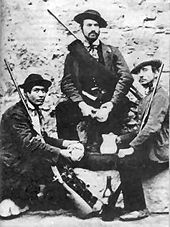
Banditry
Encyclopedia

Oxford English Dictionary
The Oxford English Dictionary , published by the Oxford University Press, is the self-styled premier dictionary of the English language. Two fully bound print editions of the OED have been published under its current name, in 1928 and 1989. The first edition was published in twelve volumes , and...
defines as "one who is proscribed or outlaw
Outlaw
In historical legal systems, an outlaw is declared as outside the protection of the law. In pre-modern societies, this takes the burden of active prosecution of a criminal from the authorities. Instead, the criminal is withdrawn all legal protection, so that anyone is legally empowered to persecute...
ed; hence, a lawless desperate marauder, a brigand: usually applied to members of the organized gangs which infest the mountainous districts of Italy, Sicily, Spain, Greece, and Turkey." But the OED also states that in modern usage it may be used as a synonym for gangster, hence the term "one-armed bandit" for gambling machines can leave the gambler with no money.
Origin of the word
The term bandit (introduced to English via Italian around 1590) originates with the early Germanic legal practice of outlawing criminals, termed *bannan (English ban). The legal term in the Holy Roman EmpireHoly Roman Empire
The Holy Roman Empire was a realm that existed from 962 to 1806 in Central Europe.It was ruled by the Holy Roman Emperor. Its character changed during the Middle Ages and the Early Modern period, when the power of the emperor gradually weakened in favour of the princes...
was Acht or Reichsacht, translated as "Imperial ban".
History
About 5,000 bandits were executed by Pope Sixtus VPope Sixtus V
Pope Sixtus V , born Felice Peretti di Montalto, was Pope from 1585 to 1590.-Early life:The chronicler Andrija Zmajević states that Felice's family originated from modern-day Montenegro...
in the five years before his death in 1590, but there were reputedly 27,000 more at liberty throughout central Italy.
Banditry was one of the most common peasant reaction to oppression and hardship. The growth of warlord armies in China was also accompanied by a dramatic increase in bandit activity in the republican period; by 1930 the total bandit population was estimated to be 20 million.

